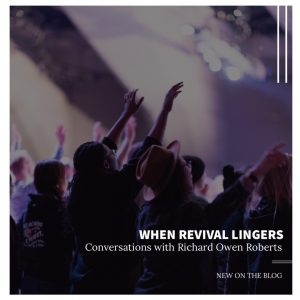When Revival Lingers…Conversations with Richard Owen Roberts #1

Looking back on my life, I realize now that I grew up in South Africa in the environment of an on-going revival.
The revival had begun in my father’s heart, and then in the church he was pastoring at the time, in the city of Durban, in the early 1960’s. People were being saved every Sunday. Water baptisms were at least a monthly occurrence. But more than anything else I remember how powerful mid-week prayer meetings were and the extraordinary sense of God’s presence in the life of the church.
My spiritual life and appetites were shaped in those years.
It wasn’t all smooth sailing.
I remember some significant battles my father and the church went through at the time, not the least of which was my older brother abandoning his faith in the middle of the revival (he later had a dramatic return to faith, but that is another story for another time).
One of the amazing things about that revival was its duration.
When I left South Africa to come to the USA for studies in 1966, the outpouring of the Spirit was still in progress and for quite a few years after I left.
That is unusual.
One of the saddest things about studying historical revivals is when you discover how short-lived some of them were. I don’t have any data to prove my point, but my guess is that the average lifespan of most historical revivals was 9-18 months.
In the case of one of the most famous revivals in America in the early 1700’s, under the leadership of Jonathan Edwards, the revival lasted 18 months. Edwards’ stance against sin eventually drew the ire of his congregation and even the anger of the town to the point that the family had to leave the area and without his leadership the revival sadly dissipated.
In a conversation I had with revival scholar Richard Owen Roberts, he shared that his belief that one factor in the demise of revival is the staying power of pastors to keep with revival.
He believes that there are two critical elements that constitute revival:
- The manifest presence of God.
- The Word of God itself acting like a flood.
In revival the Word itself takes on a more significant power.
In 2 Thessalonians 3, Paul gives a prayer request that the Word will run swiftly like a flood….an example of what happens in revival. This is just as important to revival as the manifest presence of God. The Word, in a revival setting, grips and convicts and delivers people in a way that cannot be explained by any human facility or persuasion (Richard Owen Roberts).
In the Welsh revival of 1904-05, which lasted only 18 short months, Evan Roberts, the leader, became focused on visions, revelations and experiences, and the general feeling was that preaching was not needed…and this was the point of the revival’s failure (Richard Owen Roberts).
As many of us are calling on the Lord for revival in our day, the only hope our nation has right now, there are many lessons from historical revivals that will help us rightly steward God’s work to reach its maximum impact on our city and region.
I personally believe that the reason the revival tarried for such a long time in my father’s life and ministry in South Africa was his unswerving determination not to allow the experience of God’s miraculous work run any faster than the Word was able to nurture and protect His maturing work in our hearts. Preaching the full counsel of God remained a priority for him until the day he left this earth for God’s eternal presence.
God’s manifest presence AND the Word…recipe for why revival tarries.
P.S. For more from Richard Owen Roberts, please go to churchawakening.com and access “Courses and Conversations.”

Who is the author of this article? It sounds like it’s supposed to be Richard Owen Roberts, but then the writer says, in a conversation with Richard Owen Roberts…., so who is it that is speaking?
Hi, Lori! Pastor Alec Rowlands is the author of this article.